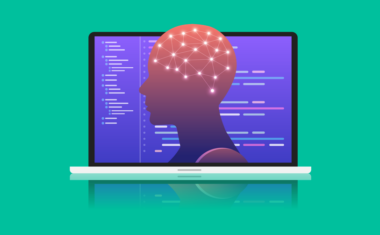Software and data are the twin mantles of tech and the future of business. While both data scientists and software engineers are well-versed in hard computer science skills such as coding and machine learning, they use these skills to achieve different ends. Where software engineers build applications and systems, data scientists tease out meaningful and actionable insights from collected data.
The two disciplines work in tandem: data scientists make sense of the troves of collected information, which software engineers then use to create or improve on a product. If you are considering a career in tech, your choice between data science and software engineering will depend on your personal strengths, interests, and technical skills.
Data scientists and software engineers play important roles within organizations that work with digital products, services, and platforms. But their skills and areas of focus are considerably different. So, which is harder? Learn more about the two professions here.
What is data science?
The explosion of big data generated by connected devices, social media, and business transactions means that organizations are capturing unprecedented amounts of real-time data—to the tune of a collective 2.3 trillion gigabytes per day. If properly collected, organized, and analyzed, this data can reveal impactful insights. That’s where data scientists come in.
Data scientists are akin to detectives: they gather and interpret evidence to make meaning. They interpret data in order to reveal concealed patterns and track trends that will help an organization set its priorities. Organizations use data science to optimize product development, reduce operational costs, calculate risk, and better connect with consumers.
The “detective” work of a data scientist happens within a technical framework: they acquire and clean data sets, then validate, integrate, and analyze the data using machine learning, statistical modeling, and advanced algorithms.
What is software engineering?
Software engineers are the builders: they design the architecture of digital products.
Using programming languages such as Python and Java, software engineers build everything from mobile apps to operating systems. While some engineers can build both the front-end user-facing application and the back-end that powers a program (I.e. full-stack engineers), many software developers specialize in one or another.
Software engineers approach software development as problem-solving. Software engineers use analytical insights produced by data scientists in order to identify user issues and formulate product-based solutions. After figuring out how a product will fix the problem at hand, software engineers collaborate with designers to outline a sleek, functional design that meets project requirements. Software engineers then build, test, and troubleshoot their product. Following its launch, software engineers will maintain the product and improve it with updates and new features.
Get To Know Other Data Science Students
Mengqin (Cassie) Gong
Data Scientist at Whatsapp
Lou Zhang
Data Scientist at MachineMetrics
Sunil Ayyappan
Senior Technical Program Manager (AI) at LinkedIn
4 technical skills all data scientists need
Data science skills run the gamut computer science, statistics, and communication.
Here are a few hard skills data scientists need:
- Coding. Programming languages such as Python and SQL are used to wrangle data, build and manage data libraries, and implement machine learning algorithms.
- Statistical modeling. Inferential statistics are applied to identify the trends and characteristics of a data set. Foundational techniques like regression analysis, which demonstrates a causal relationship between variables, are used to explore data and pave the way for predictive modeling and other in-depth methods of analysis.
- Machine learning. Machine learning enables data scientists to automatically identify and predict groups or categories within data sets. Data scientists must implement supervised and unsupervised machine learning algorithms based on vital machine learning techniques such as decision trees, clustering, naive Bayes classifiers, and more.
- Big data management. As the volume of inbound data balloons, data scientists must use processing framework tools like Spark and Hadoop to store, clean, and organize large data sets.
4 technical skills all software engineers need
Software engineers use a combination of engineering principles and computer science skills to build programs and applications.
Here are some hard skills that software engineers need.
- Front end development. Software engineers use JavaScript and other standard programming languages to build a web page or application. Skills like DOM manipulation, event-driven programming, and debugging are also crucial to crafting a smooth user interface.
- Back end development. This requires a command of at least one popular programming language — Python, Flask, PHP, and Ruby are key examples. Back end development also requires SQL proficiency to construct and maintain the databases that store application and client data.
- Version control proficiency. Version control tools like Github are used to track and manage changes to source code. These platforms help preserve the integrity and consistency of a code base and enable teamwide collaboration.
- Scalable design. Software engineers must design scalable products that can handle the large amount of data generated by an ever-growing user base. Software engineers use cloud infrastructure, domain-driven design, and automation to create software that is capable of handling increasingly vast volumes of data.
Which is harder: data science or software engineering?
The distinct challenges and responsibilities of data science and software engineering will suit people with different dispositions, interests, and aptitudes.
Data science will appeal to those who are natural critical and analytical thinkers who enjoy spotting patterns, trends, and relationships between variables in the world around them. This work is ideal for the meticulous detective who enjoys collecting, assembling, and interpreting evidence to explain phenomena. If you have a knack for statistics and an analytical streak, you might find data science to be the easier of the two professions.
Software engineering will attract those who like to problem solve and build within parameters. This work caters to the architects—someone who loved LEGO as a kid might find a similar sense of gratification in the construction of software. If you enjoy hands-on building and have a mind for both form and function, software engineering might be the path that comes most naturally.
While both data science and software engineering require overlapping skills—namely, coding and the ability to problem-solve—the former profession focuses on finding meaning in data sets, while the latter is focused on building products supported by those findings. Focusing on the emphasis of each field will help you assess which career track is the best match for your skills and strengths.
Companies are no longer just collecting data. They’re seeking to use it to outpace competitors, especially with the rise of AI and advanced analytics techniques. Between organizations and these techniques are the data scientists – the experts who crunch numbers and translate them into actionable strategies. The future, it seems, belongs to those who can decipher the story hidden within the data, making the role of data scientists more important than ever.
In this article, we’ll look at 13 careers in data science, analyzing the roles and responsibilities and how to land that specific job in the best way. Whether you’re more drawn out to the creative side or interested in the strategy planning part of data architecture, there’s a niche for you.
Is Data Science A Good Career?
Yes. Besides being a field that comes with competitive salaries, the demand for data scientists continues to increase as they have an enormous impact on their organizations. It’s an interdisciplinary field that keeps the work varied and interesting.
10 Data Science Careers To Consider
Whether you want to change careers or land your first job in the field, here are 13 of the most lucrative data science careers to consider.
Data Scientist
Data scientists represent the foundation of the data science department. At the core of their role is the ability to analyze and interpret complex digital data, such as usage statistics, sales figures, logistics, or market research – all depending on the field they operate in.
They combine their computer science, statistics, and mathematics expertise to process and model data, then interpret the outcomes to create actionable plans for companies.
General Requirements
A data scientist’s career starts with a solid mathematical foundation, whether it’s interpreting the results of an A/B test or optimizing a marketing campaign. Data scientists should have programming expertise (primarily in Python and R) and strong data manipulation skills.
Although a university degree is not always required beyond their on-the-job experience, data scientists need a bunch of data science courses and certifications that demonstrate their expertise and willingness to learn.
Average Salary
The average salary of a data scientist in the US is $156,363 per year.
Data Analyst
A data analyst explores the nitty-gritty of data to uncover patterns, trends, and insights that are not always immediately apparent. They collect, process, and perform statistical analysis on large datasets and translate numbers and data to inform business decisions.
A typical day in their life can involve using tools like Excel or SQL and more advanced reporting tools like Power BI or Tableau to create dashboards and reports or visualize data for stakeholders. With that in mind, they have a unique skill set that allows them to act as a bridge between an organization’s technical and business sides.
General Requirements
To become a data analyst, you should have basic programming skills and proficiency in several data analysis tools. A lot of data analysts turn to specialized courses or data science bootcamps to acquire these skills.
For example, Coursera offers courses like Google’s Data Analytics Professional Certificate or IBM’s Data Analyst Professional Certificate, which are well-regarded in the industry. A bachelor’s degree in fields like computer science, statistics, or economics is standard, but many data analysts also come from diverse backgrounds like business, finance, or even social sciences.
Average Salary
The average base salary of a data analyst is $76,892 per year.
Business Analyst
Business analysts often have an essential role in an organization, driving change and improvement. That’s because their main role is to understand business challenges and needs and translate them into solutions through data analysis, process improvement, or resource allocation.
A typical day as a business analyst involves conducting market analysis, assessing business processes, or developing strategies to address areas of improvement. They use a variety of tools and methodologies, like SWOT analysis, to evaluate business models and their integration with technology.
General Requirements
Business analysts often have related degrees, such as BAs in Business Administration, Computer Science, or IT. Some roles might require or favor a master’s degree, especially in more complex industries or corporate environments.
Employers also value a business analyst’s knowledge of project management principles like Agile or Scrum and the ability to think critically and make well-informed decisions.
Average Salary
A business analyst can earn an average of $84,435 per year.
Database Administrator
The role of a database administrator is multifaceted. Their responsibilities include managing an organization’s database servers and application tools.
A DBA manages, backs up, and secures the data, making sure the database is available to all the necessary users and is performing correctly. They are also responsible for setting up user accounts and regulating access to the database. DBAs need to stay updated with the latest trends in database management and seek ways to improve database performance and capacity. As such, they collaborate closely with IT and database programmers.
General Requirements
Becoming a database administrator typically requires a solid educational foundation, such as a BA degree in data science-related fields. Nonetheless, it’s not all about the degree because real-world skills matter a lot. Aspiring database administrators should learn database languages, with SQL being the key player. They should also get their hands dirty with popular database systems like Oracle and Microsoft SQL Server.
Average Salary
Database administrators earn an average salary of $77,391 annually.
Data Engineer
Successful data engineers construct and maintain the infrastructure that allows the data to flow seamlessly. Besides understanding data ecosystems on the day-to-day, they build and oversee the pipelines that gather data from various sources so as to make data more accessible for those who need to analyze it (e.g., data analysts).
General Requirements
Data engineering is a role that demands not just technical expertise in tools like SQL, Python, and Hadoop but also a creative problem-solving approach to tackle the complex challenges of managing massive amounts of data efficiently.
Usually, employers look for credentials like university degrees or advanced data science courses and bootcamps.
Average Salary
Data engineers earn a whooping average salary of $125,180 per year.
Database Architect
A database architect’s main responsibility involves designing the entire blueprint of a data management system, much like an architect who sketches the plan for a building. They lay down the groundwork for an efficient and scalable data infrastructure.
Their day-to-day work is a fascinating mix of big-picture thinking and intricate detail management. They decide how to store, consume, integrate, and manage data by different business systems.
General Requirements
If you’re aiming to excel as a database architect but don’t necessarily want to pursue a degree, you could start honing your technical skills. Become proficient in database systems like MySQL or Oracle, and learn data modeling tools like ERwin. Don’t forget programming languages – SQL, Python, or Java.
If you want to take it one step further, pursue a credential like the Certified Data Management Professional (CDMP) or the Data Science Bootcamp by Springboard.
Average Salary
Data architecture is a very lucrative career. A database architect can earn an average of $165,383 per year.
Machine Learning Engineer
A machine learning engineer experiments with various machine learning models and algorithms, fine-tuning them for specific tasks like image recognition, natural language processing, or predictive analytics. Machine learning engineers also collaborate closely with data scientists and analysts to understand the requirements and limitations of data and translate these insights into solutions.
General Requirements
As a rule of thumb, machine learning engineers must be proficient in programming languages like Python or Java, and be familiar with machine learning frameworks like TensorFlow or PyTorch. To successfully pursue this career, you can either choose to undergo a degree or enroll in courses and follow a self-study approach.
Average Salary
Depending heavily on the company’s size, machine learning engineers can earn between $125K and $187K per year, one of the highest-paying AI careers.
Quantitative Analyst
Qualitative analysts are essential for financial institutions, where they apply mathematical and statistical methods to analyze financial markets and assess risks. They are the brains behind complex models that predict market trends, evaluate investment strategies, and assist in making informed financial decisions.
They often deal with derivatives pricing, algorithmic trading, and risk management strategies, requiring a deep understanding of both finance and mathematics.
General Requirements
This data science role demands strong analytical skills, proficiency in mathematics and statistics, and a good grasp of financial theory. It always helps if you come from a finance-related background.
Average Salary
A quantitative analyst earns an average of $173,307 per year.
Data Mining Specialist
A data mining specialist uses their statistics and machine learning expertise to reveal patterns and insights that can solve problems. They swift through huge amounts of data, applying algorithms and data mining techniques to identify correlations and anomalies. In addition to these, data mining specialists are also essential for organizations to predict future trends and behaviors.
General Requirements
If you want to land a career in data mining, you should possess a degree or have a solid background in computer science, statistics, or a related field.
Average Salary
Data mining specialists earn $109,023 per year.
Data Visualisation Engineer
Data visualisation engineers specialize in transforming data into visually appealing graphical representations, much like a data storyteller. A big part of their day involves working with data analysts and business teams to understand the data’s context.
General Requirements
Data visualization engineers need a strong foundation in data analysis and be proficient in programming languages often used in data visualization, such as JavaScript, Python, or R. A valuable addition to their already-existing experience is a bit of expertise in design principles to allow them to create visualizations.
Average Salary
The average annual pay of a data visualization engineer is $103,031.
Resources To Find Data Science Jobs
The key to finding a good data science job is knowing where to look without procrastinating. To make sure you leverage the right platforms, read on.
Job Boards
When hunting for data science jobs, both niche job boards and general ones can be treasure troves of opportunity.
Niche boards are created specifically for data science and related fields, offering listings that cut through the noise of broader job markets. Meanwhile, general job boards can have hidden gems and opportunities.
Online Communities
Spend time on platforms like Slack, Discord, GitHub, or IndieHackers, as they are a space to share knowledge, collaborate on projects, and find job openings posted by community members.
Network And LinkedIn
Don’t forget about socials like LinkedIn or Twitter. The LinkedIn Jobs section, in particular, is a useful resource, offering a wide range of opportunities and the ability to directly reach out to hiring managers or apply for positions. Just make sure not to apply through the “Easy Apply” options, as you’ll be competing with thousands of applicants who bring nothing unique to the table.
FAQs about Data Science Careers
We answer your most frequently asked questions.
Do I Need A Degree For Data Science?
A degree is not a set-in-stone requirement to become a data scientist. It’s true many data scientists hold a BA’s or MA’s degree, but these just provide foundational knowledge. It’s up to you to pursue further education through courses or bootcamps or work on projects that enhance your expertise. What matters most is your ability to demonstrate proficiency in data science concepts and tools.
Does Data Science Need Coding?
Yes. Coding is essential for data manipulation and analysis, especially knowledge of programming languages like Python and R.
Is Data Science A Lot Of Math?
It depends on the career you want to pursue. Data science involves quite a lot of math, particularly in areas like statistics, probability, and linear algebra.
What Skills Do You Need To Land an Entry-Level Data Science Position?
To land an entry-level job in data science, you should be proficient in several areas. As mentioned above, knowledge of programming languages is essential, and you should also have a good understanding of statistical analysis and machine learning. Soft skills are equally valuable, so make sure you’re acing problem-solving, critical thinking, and effective communication.
Since you’re here…Are you interested in this career track? Investigate with our free guide to what a data professional actually does. When you’re ready to build a CV that will make hiring managers melt, join our Data Science Bootcamp which will help you land a job or your tuition back!





